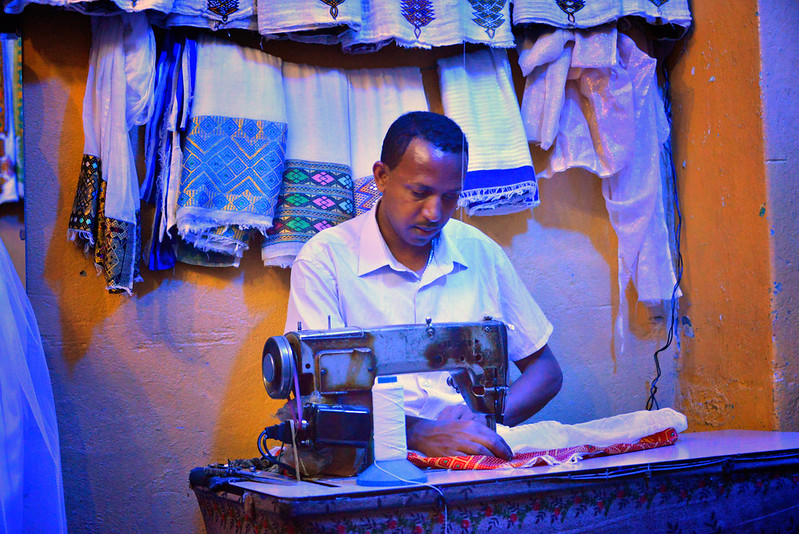Fighting Poverty in Fashion: Brands That Give Back
 Working conditions in the fashion industry are often less than ideal. Despite providing job opportunities for workers in impoverished countries, many of these employees make 42% to 55% under a living wage. When fighting poverty in fashion, improving workers’ rights is paramount to helping better the industry. Donations through third-party charities are a common way organizations have provided their support for changing the fashion industry. However, this charitable work is often criticized for its lack of actual change seen by the workers. As such, three companies have found a more productive way to help increase transparency, sustainability and worker’s rights. In an effort to change the fashion industry, Lucy and Yak, Girlfriend Collective and ABLE have all shown creative solutions and fast success as clothing corporations in developing countries around the world.
Working conditions in the fashion industry are often less than ideal. Despite providing job opportunities for workers in impoverished countries, many of these employees make 42% to 55% under a living wage. When fighting poverty in fashion, improving workers’ rights is paramount to helping better the industry. Donations through third-party charities are a common way organizations have provided their support for changing the fashion industry. However, this charitable work is often criticized for its lack of actual change seen by the workers. As such, three companies have found a more productive way to help increase transparency, sustainability and worker’s rights. In an effort to change the fashion industry, Lucy and Yak, Girlfriend Collective and ABLE have all shown creative solutions and fast success as clothing corporations in developing countries around the world.
Lucy and Yak
Lucy and Yak started in New Zealand. Chris Tenwick and Lucy Greenwood began their journey traveling the world, creating tobacco pouches, which they sold to travelers visiting the country. The couple headed back to the U.K., where they sold vintage clothing and homemade overalls out of their van, named Yak. They traveled to China, India and Thailand looking for a production company and landed on three tailors in Rajasthan, India. In Rajasthan, nearly 15% of the population lives below the poverty line. One of the biggest components of GDP growth for Rajasthan is industry, making Lucy and Yak’s choice of location a profitable and impactful one.
Since 2018, the team of three grew into 50, opening job opportunities for many. A new, climate-controlled and ethically sustainable factory stands to produce Lucy and Yak products in the rural region of Rajasthan. With this factory, the company can provide compensation higher than the minimum wage for the area and support their workers’ individual needs. Greenwood and Tenwick often visit the team in India as oversight for production and to catch up with their old friends from the van days. Overall, when fighting poverty in fashion, Lucky and Yak pave the way for a standard of ethical production.
Girlfriend Collective
Girlfriend Collective is an activewear company based out of Seattle, Washington. Bottles, cotton industry scraps, recycled nylon and polyester all make up Girlfriend Collective’s clothes. The company currently sources its recycled materials from Taiwan and its core production comes from Hanoi, Vietnam. The Hanoi factory in the Phu Tho province is an area dedicated to sustainable poverty reduction. It is also an SA8000-certified facility, meaning the factory is held to a sustainable and ethical standard of fair wages and safe worker’s conditions.
Moreover, Girlfriend Collective supplies its workers with free lunch and dinner, guided exercise breaks and health checkups every six months at the factory. Worldwide, Girlfriend Collective has been acknowledged for its success. The Universal Declaration of Human Rights and the International Labour Organization have applauded Girlfriend Collective for its efforts. Thus, with its mission to ensure health and safety for its employees, Girlfriend Collective has made its mark in fighting poverty in fashion.
ABLE
ABLE is a women-owned fashion company that dedicates itself to the advancement of women worldwide. Its international employment program began in Ethiopia with the production of scarves. Since 2019, the company has expanded similar programs in Mexico, India and Brazil. One of the company’s overall goals is to educate its consumers on wage inequities. Around the world, 98% of people making clothing cannot make a living wage. Women comprise 75% of this figure. ABLE has also solidified its own evaluation system called Accountable. With this system, ABLE can hold itself accountable and continue making a positive impact on its company.
The Future for Fighting Poverty in Fashion
In efforts to alleviate poverty around the world, these three companies are taking the lead. Their oversight has impacted impoverished communities in Vietnam, Ethiopia and India in a new and positive light. Overall, by ensuring living wages, safe working conditions and women empowerment, Lucy and Yak, Girlfriend and ABLE are helping to fight poverty in fashion.
– Julia Fadanelli
Photo: Flickr
